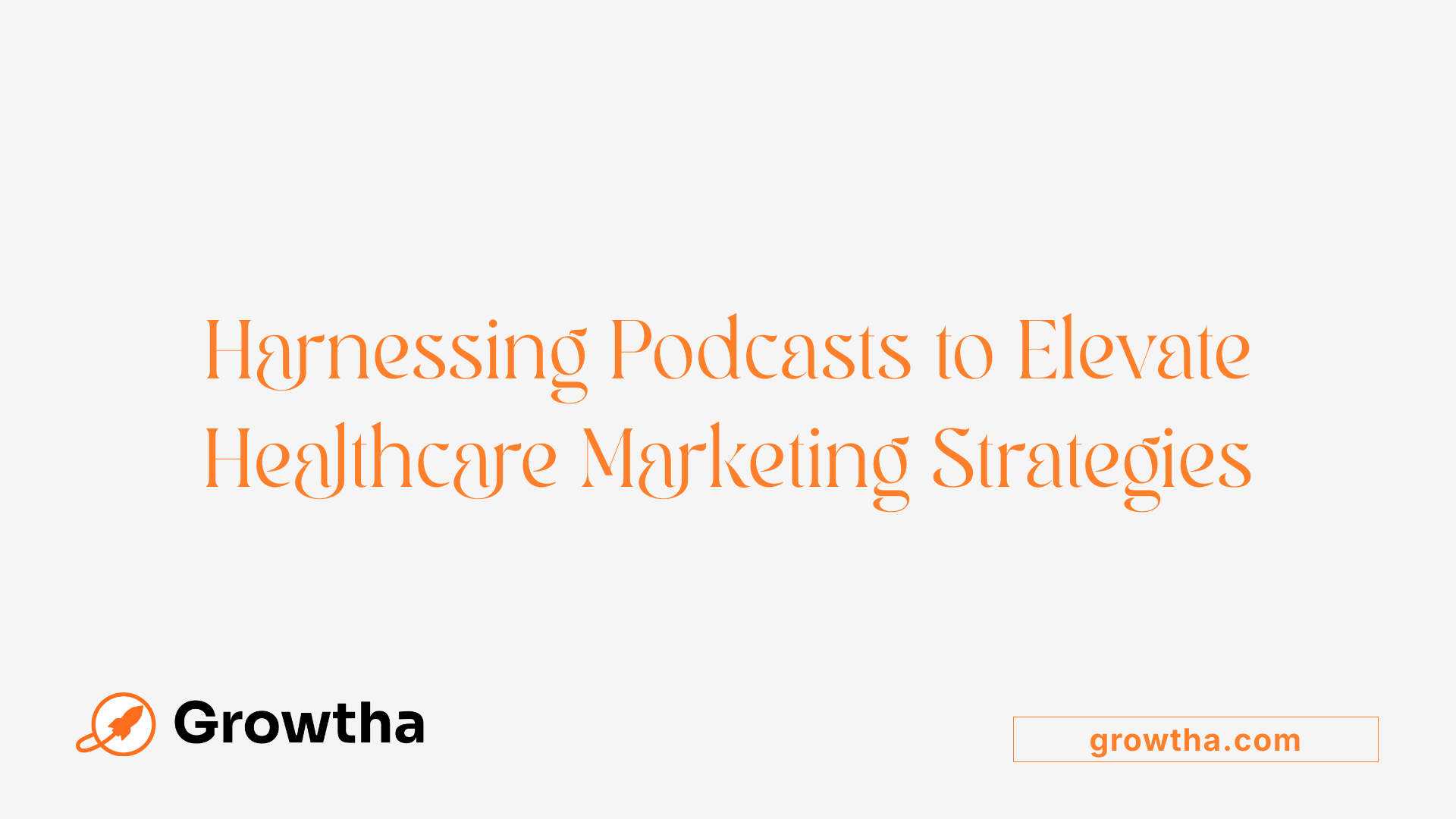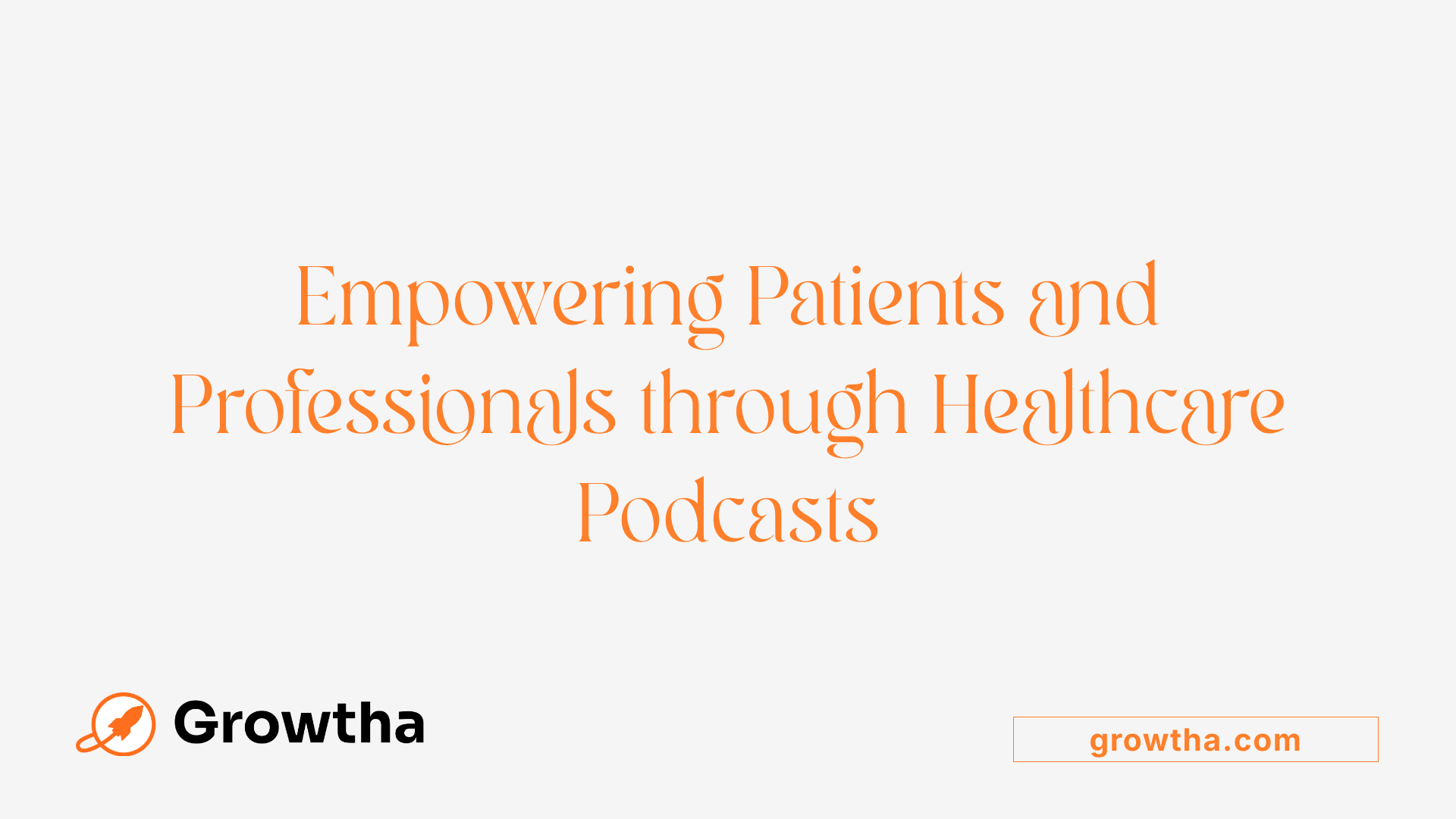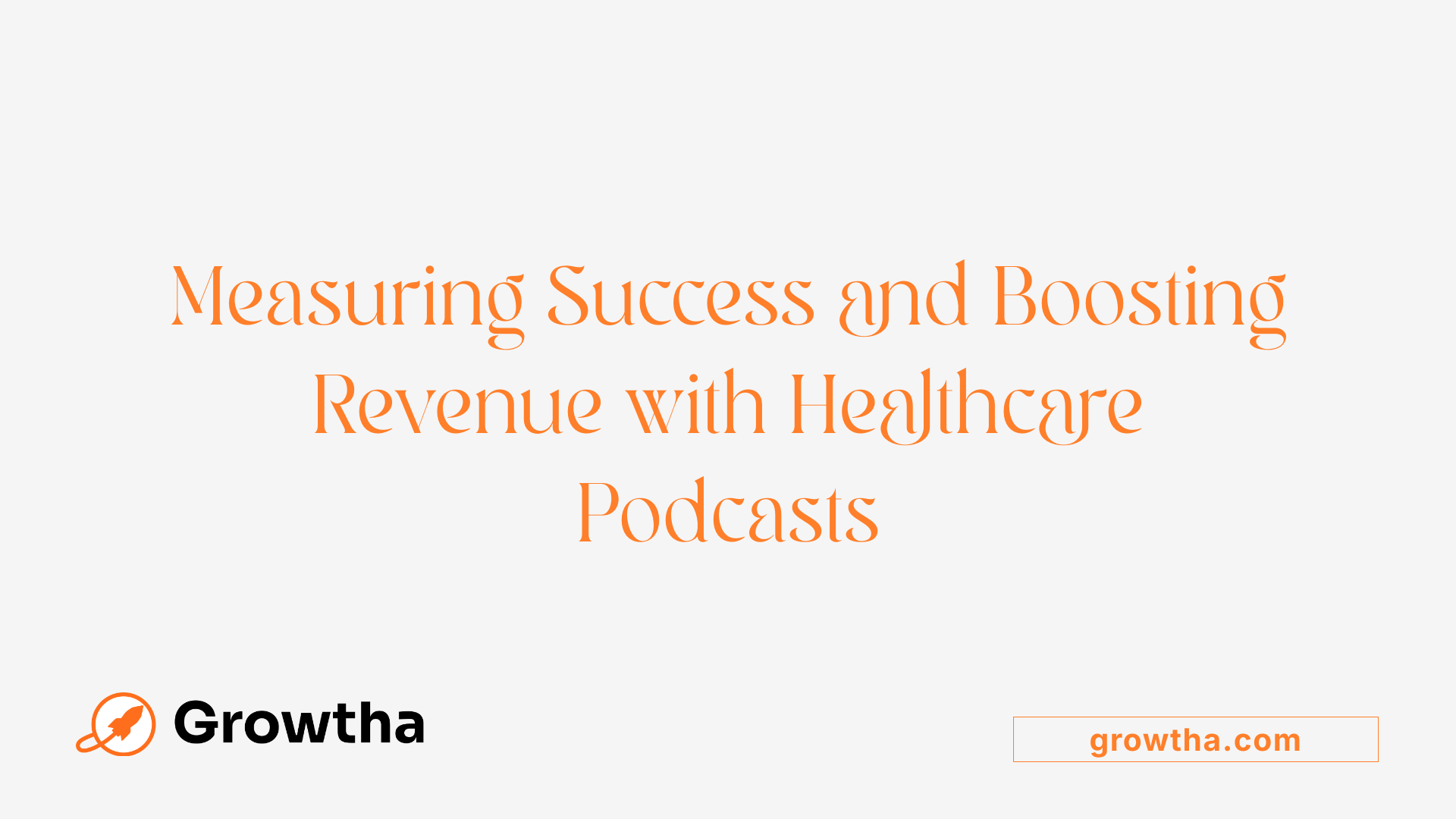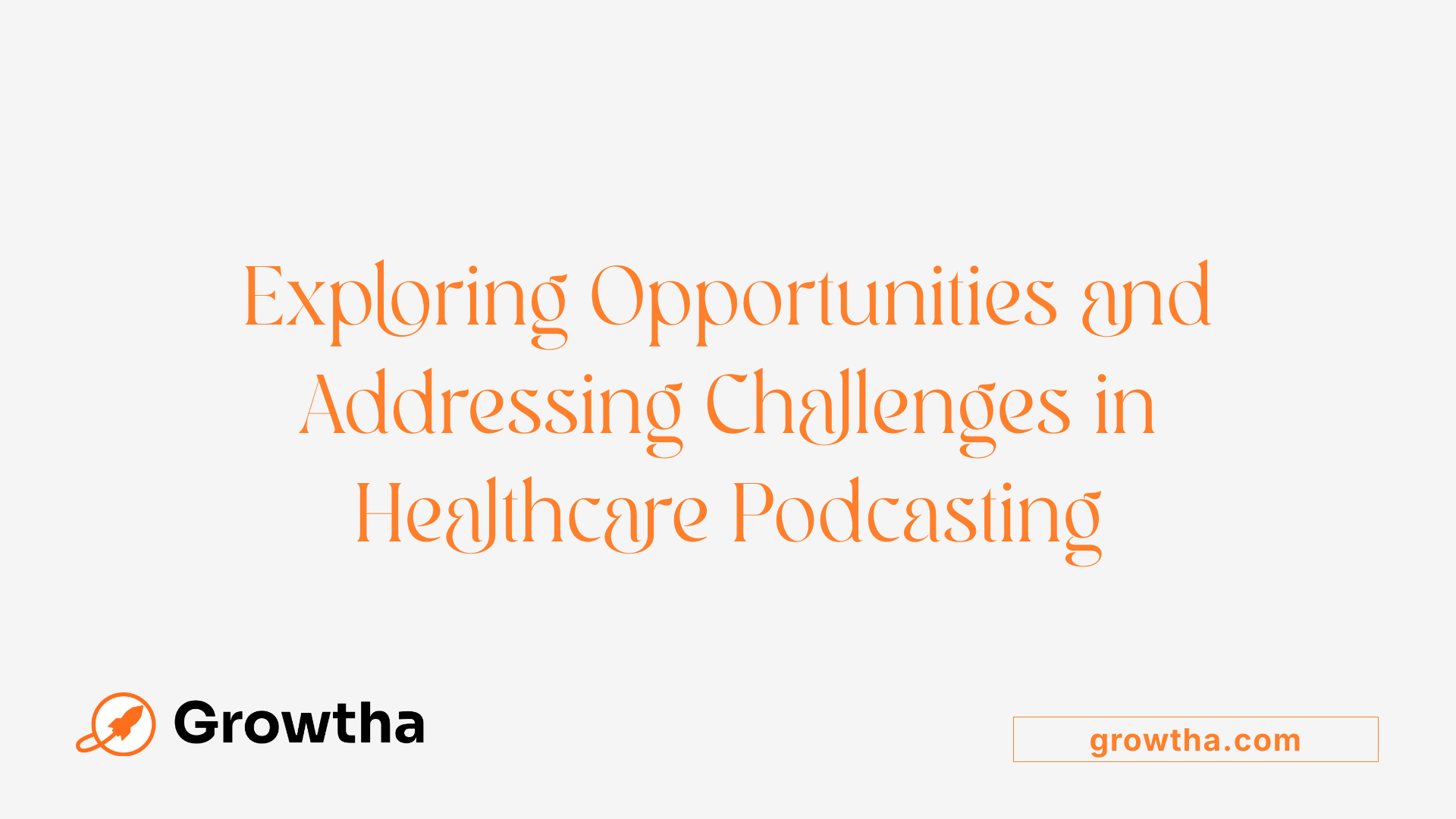The Role of Podcasts in Healthcare Marketing
Harnessing Audio: Podcasts as a Driving Force in Healthcare Marketing Innovation


The Role of Podcasts in Healthcare Marketing
Transforming Healthcare Communication Through Podcasts
The landscape of healthcare marketing is evolving rapidly, with podcasts emerging as a pivotal tool for engaging audiences, sharing expertise, and fostering trust within the healthcare community. This article explores the multifaceted role of podcasts in healthcare marketing, revealing how organizations are leveraging this versatile medium to achieve strategic goals, enhance patient relationships, and stay ahead of industry trends.
Understanding the Strategic Role of Podcasts in Healthcare Marketing

How does podcasting help with marketing?
Podcasting serves as a powerful marketing tool within the healthcare industry by significantly boosting brand awareness and recognition. Engaging and relevant content establishes a company or healthcare provider as an authority, helping to build trust and credibility among target audiences. Humanizing the brand through behind-the-scenes insights, patient stories, and interviews with industry experts fosters stronger emotional connections.
Additionally, podcasts improve online visibility; when transcribed, episodes can enhance search engine optimization (SEO), making it easier for potential patients and partners to find the content online. The community aspect of podcasts encourages listener loyalty, which can translate into increased engagement across social media platforms and better customer retention.
Cost-effectiveness and scalability are notable advantages, as producing quality content can be done with relatively low investment compared to traditional marketing channels. Monetization opportunities through advertisements and sponsorships further add revenue streams. Moreover, featuring guest experts and industry leaders strengthens partnerships and broadens reach, positioning podcasting as an integral component of healthcare marketing strategies.
How can podcasts be used effectively in content marketing?
Effective use of podcasts in content marketing hinges on offering valuable, convenient, and engaging content that fits into the busy lives of healthcare consumers and professionals. Their portability allows listeners to consume content during commutes, workouts, or routine tasks, fostering regular engagement.
Consistency is vital; brands that release episodes on a predictable schedule tend to build a loyal following. Incorporating storytelling elements, high-quality sound design, and relevant topics makes the content more enjoyable and memorable. Repurposing existing content—such as webinars or articles—into podcast episodes can enhance content utilization without significant additional effort.
Promotion strategies involve leveraging social media, email campaigns, and podcast directories to attract new listeners and encourage subscriptions. Collaborating with production agencies, industry experts, and patient advocates not only enriches content but also expands reach. Monetization avenues like sponsorships and dynamic ad insertions can supplement marketing budgets while amplifying the message.
The Growing Impact of Healthcare Podcasts
Healthcare podcasts are gaining momentum, with their share of advertising revenues increasing substantially. In 2022, healthcare accounted for 7% of all podcast ad revenue, marking a 40% year-over-year growth. Over 82 million Americans listened to podcasts in 2021, a number projected to surpass 100 million by 2024.
Podcasts serve multifunctional roles—educating patients, updating healthcare professionals, and promoting products—while offering convenience and fostering community. They stand out for their ability to provide long-form, detailed content that resonates with niche audiences, such as specialists or medical students.
Many healthcare organizations now embed podcasts into their communication and branding efforts, recognizing their potential for engagement and influence. Podcasts also support industry thought leadership, offering professionals opportunities to share insights, innovations, and practical tips.
Establishing Authority and Trust through Content
Partnering with renowned experts and sharing impactful patient stories humanizes healthcare content, making it more trustworthy and relatable. Such collaborations enhance credibility, build trust, and foster a sense of community among listeners.
However, maintaining compliance with regulations like HIPAA is crucial. Ensuring patient privacy, data security, and accuracy sustains credibility and legal standards.
Measuring Success and Building Engagement
Effective metrics for gauging podcast success include total downloads, social media engagement, reviews and ratings, subscriber numbers, and sponsorship interest. These indicators reveal audience growth, content resonance, and advertising effectiveness.
Engaging content complemented by strategic promotion maximizes impact. Incorporating listener feedback and industry trends helps refine series and tailor future episodes.
Innovative Approaches and Best Practices
Successful healthcare podcasts often focus on niche topics, such as emerging medical technologies, health policy, or patient advocacy. Structured formats, consistent release schedules, and high production quality create a professional and trustworthy image.
Introducing interactive elements like Q&A sessions, inviting guest experts, and sharing patient success stories increase listener involvement. Using AI tools for content curation and audience targeting can enhance relevance and safety.
In sum, podcasts are transforming healthcare marketing by enabling more meaningful engagement, fostering community, and strengthening brand presence. Their versatility, low barrier to entry, and broad reach make them an invaluable asset for healthcare organizations aiming to educate, influence, and grow their audiences.
| Aspect | Details | Additional Insights |
|---|---|---|
| Audience Reach | Over 82 million US listeners in 2021, expected to rise to 100 million+ in 2024 | Growing consumer demand for on-the-go health information |
| Revenue & Growth | 7% of all podcast ad revenue in healthcare for 2022, with 40% YoY increase | Increasing investment in healthcare audio content |
| Engagement Metrics | Downloads, social media activity, reviews, subscriber stats, sponsorships | Indicators of content effectiveness and brand affinity |
| Content Focus | Industry insights, patient education, expert interviews, success stories | Diverse formats including short updates and in-depth discussions |
| Regulatory Considerations | HIPAA compliance, medical accuracy, patient privacy | Essential for maintaining trust and legal standards |
| Production Tips | Clear objectives, compelling topics, quality production, effective promotion | Ensures audience retention and brand credibility |
| Advertising Strategies | Contextual relevance, trustworthiness, AI tools like SeekrAlign™ | Optimizing ad placement and audience targeting |
In this landscape, healthcare podcasts continue to evolve as an essential component of comprehensive marketing and community engagement strategies, leveraging storytelling, expert insights, and innovative technology to influence health behaviors and industry standards alike.
Impact of Podcasts on Patient Education and Healthcare Workforce Development

How can healthcare marketing efforts be supported by podcasting?
Podcasts are proving to be a valuable asset in healthcare marketing by creating authentic and personal connections with audiences. They offer a platform where healthcare providers can share their expertise in an engaging, accessible format. This method helps establish authority within specific health niches, fostering trust and credibility among listeners.
Effective healthcare podcasts target audiences with relevant content that nurtures ongoing relationships. By including calls to action and tailored messaging, they can attract qualified leads and guide potential patients along their health journey. Regular content updates, promoted across multiple channels like social media and email, improve visibility and listener engagement. Tracking metrics such as downloads, reviews, and social interactions ensures content optimization.
Overall, podcasting enhances healthcare marketing strategies by educating, engaging, and cultivating loyalty among patients and community members. Its versatility in content delivery and personal touch makes it an essential tool for health organizations aiming to boost their outreach and reputation.
How do podcasts contribute to healthcare professionals' continuous education?
Healthcare professionals increasingly rely on podcasts for ongoing learning. They provide timely, easily digestible content fitting seamlessly into busy schedules, such as during commutes or workouts. Podcasts fill gaps left by traditional education, offering insights on the latest industry trends, clinical advancements, and policy updates.
Specialized podcasts serve particular fields like emergency medicine, cardiology, or underrepresented medical disciplines, providing in-depth knowledge and innovative practices. Many of these podcasts also offer Continuing Medical Education (CME) and Maintenance of Certification (MOC) credits, boosting their educational value and motivating professionals to engage frequently.
Listening to industry leaders and peers helps healthcare workers stay informed, confident, and competent. It fosters a culture of continuous learning that encourages the adoption of new technologies and protocols, ultimately improving patient outcomes.
The role of podcasts in professional development with CME and MOC credits
Podcasts have become an important part of professional development in healthcare, especially as many now include opportunities to earn CME and MOC credits. This integration increases their appeal, offering healthcare practitioners the convenience of learning while multitasking.
Rich content geared toward certification requirements helps providers fulfill their continuing education obligations efficiently. These sponsored or accredited podcasts feature expert interviews, case discussions, and research updates aligned with certification standards.
By participating in these educational podcasts, healthcare professionals can stay current with medical advances, refine their skills, and meet licensure requirements. This ongoing education supports their confidence, competence, and ability to deliver high-quality patient care while also fostering a culture of excellence within healthcare organizations.
| Aspect | Description | Impact/Benefit |
|---|---|---|
| Audience Engagement | Creating authentic connections | Builds trust and loyalty |
| Content Relevance | Tailored episodes for target groups | Improved retention and influence |
| Education & Training | Continuous learning via specialized podcasts | Up-to-date knowledge, confidence |
| Certification Credits | CME and MOC offerings | Incentivizes ongoing education |
| Metrics for Success | Downloads, reviews, engagement | Measures impact and guides strategy |
Podcasts continue to grow as a pivotal element in healthcare marketing and education, effectively connecting providers, patients, and professionals in a shared pursuit of health innovation and improvement.
Growth Trends and Market Significance of Healthcare Podcasts

What are the current industry insights and trends in healthcare podcasting?
Healthcare podcasting is rapidly expanding, transforming into a vital channel for industry insights, thought leadership, and ongoing education. The market is embracing digital health innovations, including artificial intelligence, telemedicine, and health policy updates, reflecting broader trends in healthcare technology.
Successful podcasts focus on delivering valuable, easily digestible content tailored to healthcare professionals and consumers alike. Maintaining consistency, ensuring regulatory compliance—particularly with privacy standards like HIPAA— and deploying multimedia promotion strategies are essential for growth.
Esteemed podcasts such as Digital Health Today, Becker’s Healthcare, and Deep: The Health Marketing Podcast exemplify effective engagement by fostering knowledge sharing across sectors. These platforms feature industry leaders, discuss emerging trends, and address challenges, positioning themselves as essential tools for healthcare entities to stay ahead in digital transformation.
Overall, healthcare professionals and organizations recognize podcasts as critical in navigating the rapid pace of innovation and establishing thought leadership.
How popular are healthcare podcasts within the broader podcast ecosystem?
The popularity of healthcare podcasts has soared in recent years. In 2021, over 82 million Americans listened to podcasts, a figure projected to exceed 100 million by 2024. This growth indicates a significant adoption of audio content as a primary source of information and engagement.
In terms of advertising, healthcare made up 7% of all podcast ad revenue in 2022, experiencing a remarkable 40% year-over-year increase. This reflects both the market’s confidence in healthcare content and its effectiveness in reaching engaged audiences.
Within the content landscape, health and lifestyle podcasts rank as the third-most-popular category. Listeners display strong brand recall, with 76% able to remember at least one advertised brand, and 63% interacting with brands post-listen.
The inherent advantages of podcasts—such as convenience, portability, and rich, varied content—have propelled their prominence. Healthcare podcasts enable patients, providers, and industry stakeholders to access timely information seamlessly during commutes, workouts, or multitasking routines.
Trends, Revenue, and Industry Impact
| Aspect | Details | Additional Insights |
|---|---|---|
| Listener Growth | Over 82 million (2021); projected 100M by 2024 | Rapid adoption among general public and healthcare workers |
| Industry Share in Podcast Revenue | 7% in 2022 | A 40% increase year-over-year, signaling strong sector growth |
| Content Popularity | Health & Lifestyle third | Demonstrates audience appetite for health-related topics |
| Brand Recall & Engagement | 76% remember brands; 63% engage | Shows effectiveness in healthcare marketing through podcasts |
| Marketing Advantages | On-the-go accessibility, deep engagement | Critical for patient education, professional development, and brand visibility |
Successful Examples of Industry Podcasts
Notable podcasts such as ‘Deep: The Health Marketing Podcast,’ launched by DeepIntent, exemplify the current industry trend. The show features interviews with industry leaders like Melissa Gordon-Ring, focusing on personalization, technological adoption, and future strategies in health marketing.
These programs aim to provide practical insights, stimulate industry discussion, and foster community among healthcare marketers. Besides, single-episode topics encompass a wide array of subjects—from the impact of humor in medical advertising to capacity constraints in healthcare systems—highlighting the diversity and depth of current content.
Broader Impacts and Future Outlook
The increasing momentum of healthcare podcasts signifies their growing importance. They serve as a powerful medium for advancing education, promoting innovations, and building trust among stakeholders.
As the industry continues to evolve, podcasts are likely to integrate more interactive features, analytics tools, and targeted advertising solutions—further enhancing their value and effectiveness.
In conclusion, healthcare podcasts are not only gaining popularity but are also establishing themselves as fundamental components of healthcare marketing and professional learning strategies, with a growing influence on industry standards, patient engagement, and thought leadership.
Creating Successful Healthcare Podcasts: Strategies and Best Practices
What are the best practices for creating impactful healthcare podcasts?
Developing a successful healthcare podcast starts with clearly defining the target audience and setting specific goals. Whether aimed at healthcare professionals, patients, or industry stakeholders, understanding the listeners’ needs helps tailor content effectively.
Choosing compelling and relevant topics is essential. Content should address current trends, challenges, and innovations in healthcare, from patient engagement to technological advances. Formats like interviews, storytelling, or panel discussions can enhance engagement and provide variety.
High production quality matters. Investing in good recording equipment, sound editing, and clear audio ensures a professional feel that attracts and retains listeners. Promotion plays a pivotal role; leveraging social media platforms, email campaigns, and podcast directories increases visibility.
Engagement strategies include inviting guest experts, healthcare providers, and even patients to share stories. This humanizes content, builds credibility, and fosters trust.
Regulatory compliance cannot be overlooked. Navigating HIPAA regulations and ensuring medical accuracy safeguards your podcast’s credibility and maintains listener trust. Regular publishing schedules and analyzing listener data through analytics tools help refine content for better impact.
Overall, consistency, quality, engagement, and compliance are foundational to creating a meaningful healthcare podcast.
How do partnerships and regulatory considerations influence final podcast success?
Partnering with industry leaders, healthcare organizations, and patient advocates significantly enhances a podcast’s authority and reach. Collaborations bring diverse perspectives, increase credibility, and humanize the content, making it more relatable.
Regulatory compliance, especially related to patient privacy laws like HIPAA, ensures the content remains trustworthy and ethical. Proper legal review and adherence to data security standards prevent potential legal issues and protect sensitive information.
Both partnerships and compliance contribute to the professionalism of the podcast. They foster a sense of trust among listeners, reinforcing the expertise and integrity of the content.
Success in healthcare podcasting hinges on these relationships and ethical standards, providing a solid foundation for long-term growth and influence.
| Aspect | Importance | Details |
|---|---|---|
| Target audience & goals | Foundation | Guides content selection and format |
| Content relevance | Engagement | Addresses current healthcare issues |
| Production quality | Professionalism | Enhances listener experience |
| Promotion strategies | Reach & visibility | Social media, directories, email |
| Audience engagement | Credibility | Guest appearances, feedback, storytelling |
| Regulatory compliance | Trust & legality | HIPAA, data security, medical accuracy |
| Partnerships | Credibility & reach | Experts, healthcare orgs, patients |
| Analytics | Performance | Listener data, feedback for refinement |
Effective healthcare podcasts are those that balance high-quality content with strategic partnerships and strict adherence to regulatory standards, ensuring credibility, engagement, and growth.
Metrics, Engagement, and Monetization of Healthcare Podcasts

What are the effective metrics for evaluating a healthcare podcast?
Determining the success of a healthcare podcast relies on several critical metrics. Total downloads are a primary indicator, showing how many times episodes are accessed and giving an overall sense of reach. Social media engagement, including shares, likes, comments, and mentions, reflects how well the content resonates and spreads organically.
Reviews and ratings, especially on platforms like Apple Podcasts or Spotify, offer qualitative feedback on listener satisfaction and content quality. Subscriber growth tracks how many new listeners are consistently tuning in, indicating sustained interest.
Sponsorship interest and advertising performance metrics, such as click-through rates and conversions from ad campaigns, are essential for understanding commercial appeal.
By analyzing these indicators over time, creators can identify trends, optimize content based on audience preferences, and evaluate the return on investment. High download counts coupled with positive reviews suggest a loyal and engaged audience. Increased social media activity points to active word-of-mouth promotion, expanding exposure.
In essence, combining quantitative data like downloads and subscriber numbers with qualitative feedback like reviews provides a comprehensive view of a podcast's impact.
What strategies can enhance podcast engagement and monetization?
Enhancing engagement with healthcare podcasts starts with consistent content scheduling, which helps build listener expectation and loyalty. Encouraging interaction through social media, listener feedback, and community forums fosters a sense of belonging.
Including clear calls to action—such as subscribing, sharing, or visiting a website—can further boost engagement.
For monetization, various strategies can be employed. Dynamic ad insertions allow targeted advertising segments tailored to listener demographics and behaviors. Native advertising, where promotional content blends seamlessly with the episode, maintains listener trust.
Securing sponsorships from credible healthcare brands not only supports sustainability but also enhances content authority. Offering premium or exclusive content, like ad-free episodes or early access, can generate additional revenue.
Utilizing AI tools and detailed audience insights enables marketers to customize messaging, increase relevance, and improve ad efficacy. Building a community of loyal listeners through behind-the-scenes content, special episodes, or interactive sessions fosters long-term engagement.
Regular review of analytics helps in refining strategies, ensuring aligned growth, and maximizing revenue streams.
| Metrics & Strategies | Description | Additional Insights |
|---|---|---|
| Total Downloads | Measures overall listenership | Indicates reach and content popularity |
| Social Media Engagement | Shares, comments, mentions | Reflects audience interaction and word-of-mouth |
| Ratings & Reviews | Listener feedback | Qualitative measure of satisfaction |
| Subscriber Growth | New and retained listeners | Gauges loyalty and content relevance |
| Sponsorship & Ads | Clicks, conversions | Commercial success indicators |
| Consistency in Content | Regular schedules | Builds trust and anticipation |
| Listener Interaction | Feedback, Q&As, forums | Enhances community and retention |
| Advertising Strategies | Dynamic ads, native ads, sponsorships | Boosts monetization |
| Premium Content | Exclusive episodes, early access | Generates revenue and engagement |
| Analytics & AI Tools | Audience insights, content assessment | Enables targeted improvement |
As the healthcare podcast landscape expands, employing a combination of these metrics and strategies ensures sustained growth, relevance, and profitability.
The Future of Healthcare Podcasting: Opportunities and Challenges

What are the emerging trends and future opportunities in healthcare podcasting?
The landscape of healthcare podcasting is rapidly evolving, driven by technological innovations and changing audience preferences. One of the most prominent emerging trends is the integration of AI-driven tools, which enable content personalization. This means podcasts can tailor topics, language, and even delivery style to meet individual listener needs, increasing engagement and relevance.
Advanced analytics and speech recognition are also transforming how creators understand their audiences and refine their content. These tools provide insights into listener behavior, preferences, and engagement metrics, making content strategy more data-informed.
Multimedia elements are expanding the appeal of healthcare podcasts beyond traditional audio formats. Video podcasts, augmented reality integrations, and interactive components are increasingly being employed to foster deeper engagement. For example, visual aids accompanying audio content can help explain complex medical topics more effectively.
The use of AI extends into content creation and editing, drastically improving efficiency. Automated transcription, editing, and targeted advertising ensure that content remains fresh, relevant, and personalized. Furthermore, developing bilingual or multilingual episodes is an opportunity to reach diverse populations, addressing healthcare disparities.
Another promising area involves incorporating patient stories more prominently, humanizing content and fostering trust. Additionally, some organizations are exploring accreditation programs like Continuing Medical Education (CME) credits for podcast episodes, which can add significant educational value for professionals.
Future opportunities also include expanding partnerships with health institutions and leveraging podcasts as a core component of digital health strategies. Such integration can enhance awareness, improve patient engagement, and generate new revenue streams, cementing healthcare podcasts as an essential tool in health communication.
What challenges must healthcare podcasters address to sustain growth?
Despite the promising future, several challenges could impede growth if not properly managed. A primary concern is maintaining regulatory compliance while delivering trustworthy, accurate health information. Missteps in content accuracy can undermine credibility and trust.
Protection of patient privacy is critical, especially when creating content that involves personal stories or data. Adhering to legal standards such as HIPAA ensures that participant confidentiality is maintained, which is fundamental for reputation and legal compliance.
The crowded media environment presents another challenge. Differentiating healthcare podcasts from a vast array of content requires strategic branding, high production quality, and effective marketing efforts.
Securing high-quality production resources and expertise remains a hurdle, particularly for smaller organizations or individual creators. Budget constraints can limit the ability to produce engaging, professional content.
Accessibility issues also pose challenges. Ensuring that content is available in multiple languages, accessible formats, and caters to various learning preferences helps broaden audience reach.
Skepticism regarding the credibility of audio content may persist, demanding that creators establish partnerships with reputable healthcare institutions and experts to enhance authenticity.
Finally, continuous innovation is necessary to stay relevant. This includes adopting new technologies, exploring novel formats, and engaging audiences through interactive experiences. Overcoming these obstacles requires a combination of robust compliance protocols, technological adoption, strategic partnerships, and audience-focused content development.
| Aspect | Opportunities | Challenges | Additional Notes |
|---|---|---|---|
| Personalization | AI enables tailored content | Need for data privacy | Use in targeted health interventions |
| Multimedia | Video, AR, interactivity | Higher production costs | Enhances engagement |
| Content Quality | Credibility via expert partnerships | Regulation compliance | Maintaining accuracy and trust |
| Audience Reach | Bilingual content expansion | Accessibility barriers | Address health disparities |
| Revenue Streams | Sponsorships, CME credits | Competition, funding | Sustainability strategies |
As healthcare organizations continue to innovate, they will unlock new ways for podcasts to improve health literacy, patient engagement, and professional learning while navigating emerging hurdles.
Embracing Audio Innovation for Healthcare Outreach
As healthcare organizations increasingly recognize the strategic value of podcasts, their role in shaping industry perceptions, educating professionals, engaging patients, and driving marketing success becomes ever more integral. By leveraging the power of audio storytelling, respecting regulatory standards, and embracing technological advancements, healthcare marketers can enhance their outreach efforts, foster loyalty, and position themselves at the forefront of digital health innovation. Podcasts will continue to evolve as a vital channel—transforming healthcare communication and marketing in profound and lasting ways.
References
- Top 7 Healthcare Marketing Podcasts - We Are Amnet
- Podcasting As A Top Healthcare Marketing Trend In 2024
- Introducing: Deep: The Health Marketing Podcast - DeepIntent
- How to Make a Healthcare Podcast That Stands Out - Nexhealth
- Guide to Podcast Advertising for Healthcare - Seekr
- A podcast by medical marketers for medical marketers
- Top healthcare podcasts for marketers - WG Content
- Podcasts Are Healthcare's New Advertising Frontier - Adweek







